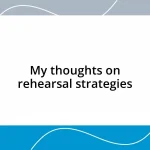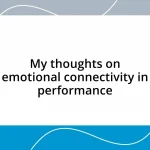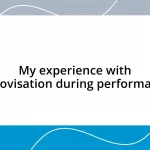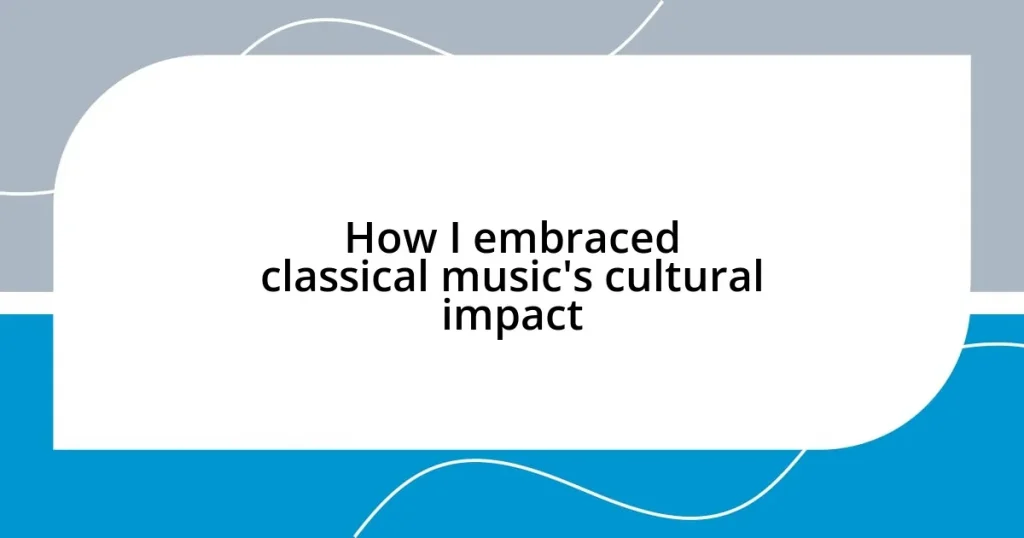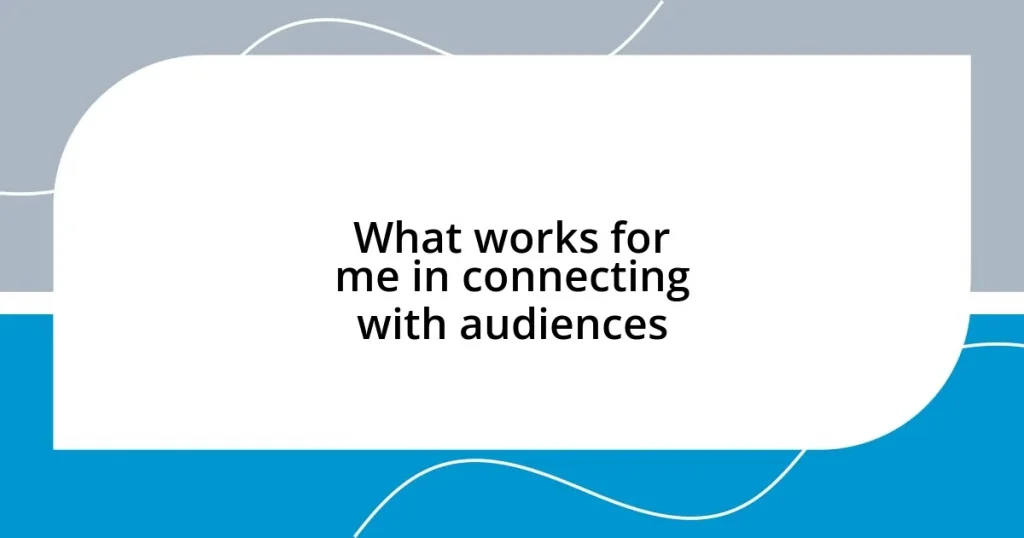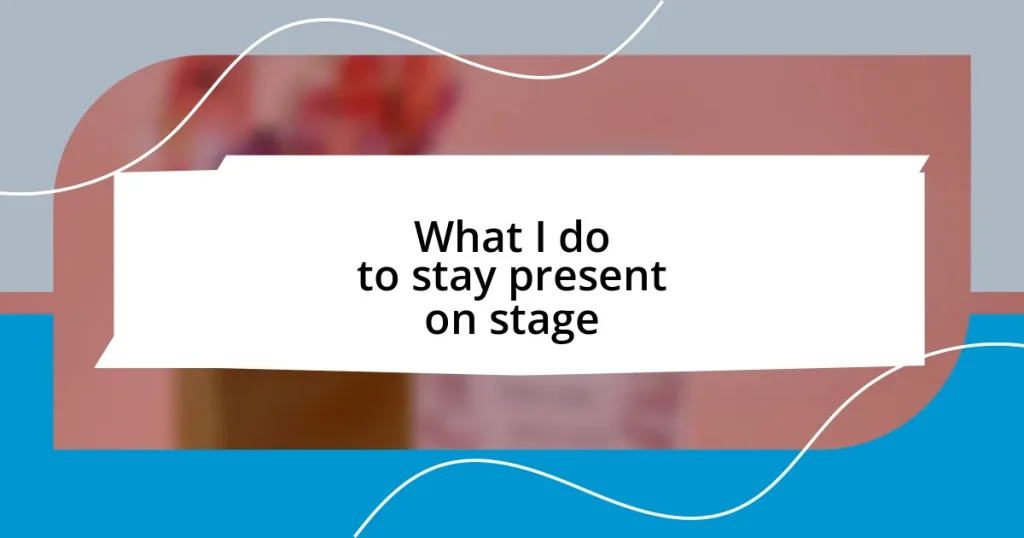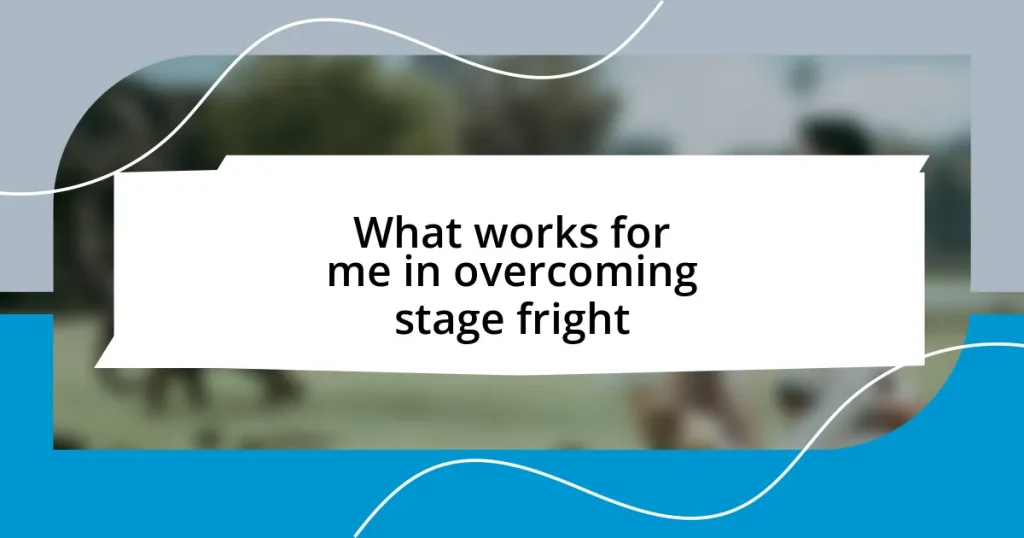Key takeaways:
- Classical music serves as a powerful language that evokes a wide range of human emotions and fosters connection and discourse.
- Influential composers like Bach, Beethoven, and Mozart created iconic works that challenge societal norms and capture universal themes, shaping cultural landscapes.
- Classical music has significant social influence, often acting as a soundtrack for political movements and communal experiences.
- Engaging with classical music communities and developing a personal listening routine can deepen appreciation and inspire future generations.
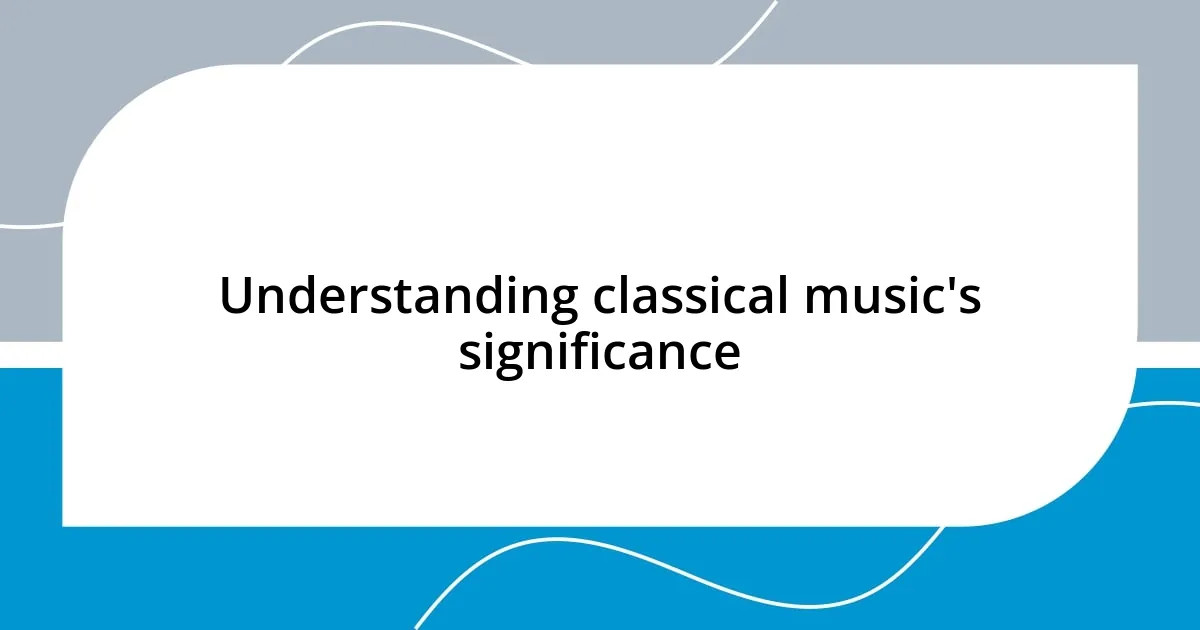
Understanding classical music’s significance
Classical music is more than just a genre; it’s a powerful language that speaks to the human experience. I remember the first time I sat in a concert hall, surrounded by the lush sounds of an orchestra. It was transformative—each note seemed to resonate with emotions I hadn’t even realized I had. Have you ever felt that connection to music? That profound moment reminded me of how classical compositions encapsulate the complexities of life, from joy to sorrow.
Many might overlook the richness of classical music, but its influence extends far beyond the concert stage. For instance, when I studied Beethoven’s symphonies, I discovered not just notes and rhythms, but a deep commentary on struggle and resilience. Can you imagine the impact of his Fifth Symphony on a crowd during difficult times? It’s remarkable how these historical pieces can still inspire and uplift us today.
I find it intriguing that classical music serves as a cultural touchstone, influencing everything from art to literature. In my own life, attending a live symphony has often sparked deep conversations with friends about the emotions evoked by specific pieces. Isn’t it fascinating how a single melody can ignite discussions about personal experiences, historical contexts, and shared humanity? Just think of the legacy these compositions carry, linking generations through their universal themes.
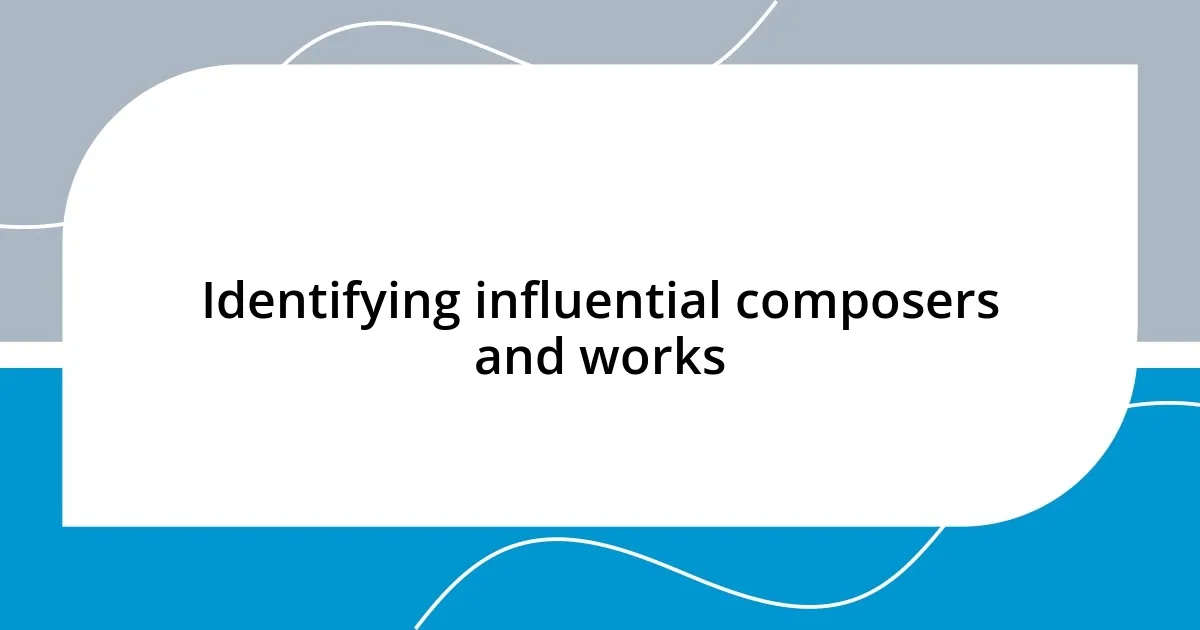
Identifying influential composers and works
To truly appreciate classical music, identifying the influential composers and their remarkable works is key. I recall an evening spent diving into the sonatas of Bach. His intricate counterpoint not only showcased his genius but also deepened my understanding of musical structure. Can you picture how his “Goldberg Variations” can evoke a sense of calm amid chaos? It’s fascinating how composers like Bach, with their ability to marry technical mastery with emotional depth, continue to resonate through the ages.
Here are a few pivotal composers and their iconic works that have significantly shaped the cultural landscape:
- Johann Sebastian Bach: “Brandenburg Concertos” – showcases the richness of orchestration and counterpoint.
- Ludwig van Beethoven: “Symphony No. 9” – a celebration of human unity and triumph, its “Ode to Joy” still inspires.
- Wolfgang Amadeus Mozart: “Requiem” – encapsulates the beauty and mystery of life and death.
- Claude Debussy: “Clair de Lune” – evokes vivid imagery and emotions, transforming everyday moments into art.
- Pyotr Ilyich Tchaikovsky: “Swan Lake” – a ballet that intertwines music and storytelling, illuminating themes of love and loss.
Each of these composers opened new avenues for emotional expression, and I often find myself reflecting on their works during quiet moments, letting the music guide my thoughts.
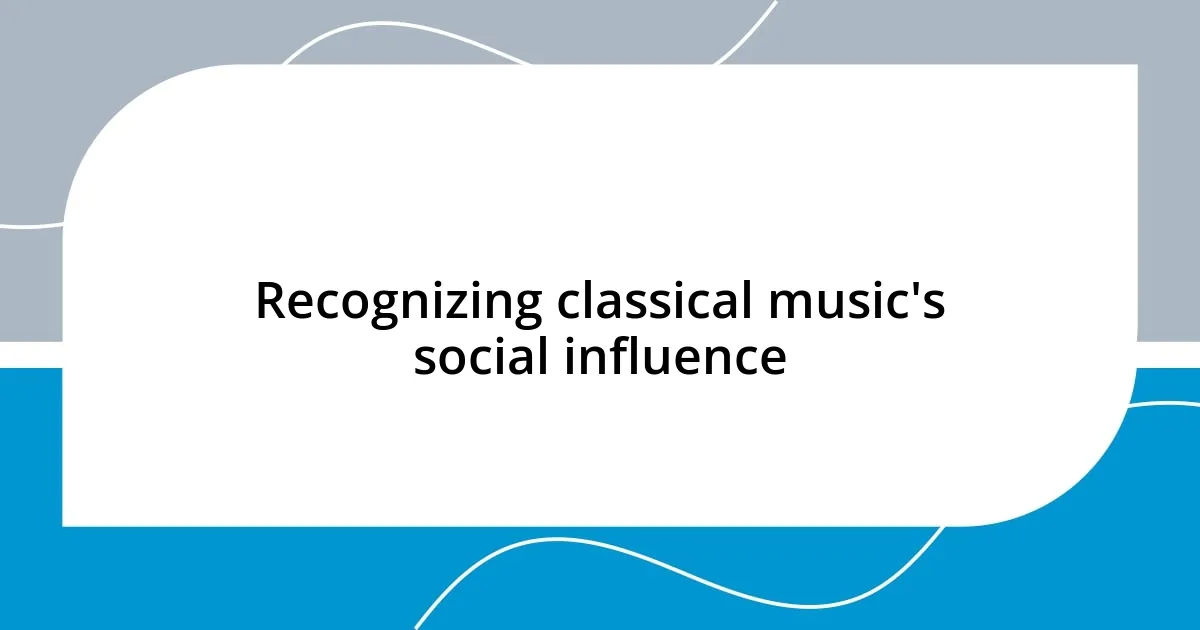
Recognizing classical music’s social influence
Recognizing classical music’s social influence can lead to some eye-opening revelations. I’ve found that during significant cultural or political movements, classical pieces often serve as both a soundtrack and a societal commentary. For instance, during the Civil Rights Movement, musicians would incorporate classical themes to evoke unity and hope. It’s astonishing how a symphonic piece can echo through the halls of history, capturing the spirit of an entire generation.
Thinking back to my experience attending a performance of Mahler’s Symphony No. 2, often referred to as the “Resurrection Symphony,” I was struck by the communal atmosphere in the hall. Each audience member was deeply engaged, savoring every moment together. This symphony not only reflects the personal struggle and triumph of life but also brings listeners together in a shared emotional experience. Doesn’t that remind you of how music can offer a sense of belonging in an ever-changing world?
When we consider the social implications of classical music, it’s clear that its reach extends far beyond personal enjoyment. For example, I remember discussing with a friend how certain operas can critique societal norms. Verdi’s “La Traviata,” for instance, portrays themes of love and sacrifice within the constraints of society. That conversation sparked a deeper appreciation for how classical music challenges us to reflect on our values and social structures.
| Social Influence Example | Description |
|---|---|
| Beethoven’s “Ode to Joy” | Chanted during political movements to symbolize unity and freedom. |
| Mahler’s Symphony No. 2 | Evokes themes of life and death, creating a communal experience during performances. |
| Verdi’s “La Traviata” | Critiques societal norms through the story of love and sacrifice. |
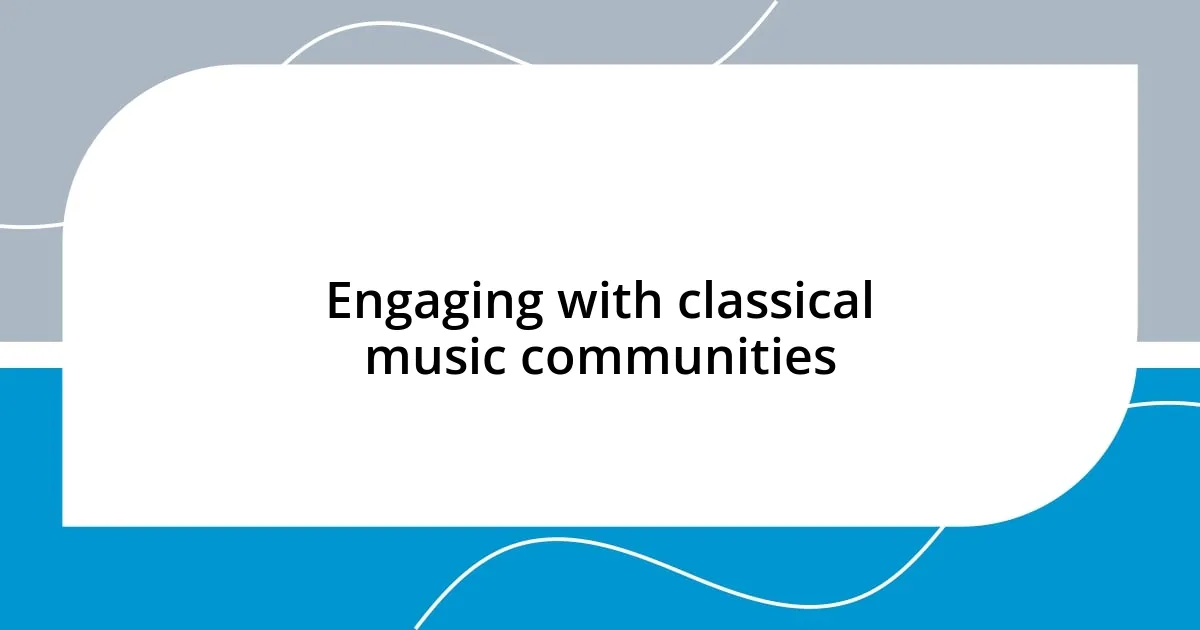
Engaging with classical music communities
Engaging with classical music communities can be an enriching experience. I remember attending a local chamber music event where the room buzzed with excitement as musicians shared their passion. You could feel the collective love for the art form; it almost reminded me of a family gathering where everyone brought something to the table. Isn’t it incredible how music can unite people from diverse backgrounds under one shared roof?
Participating in online forums dedicated to classical music has also opened my eyes. I often find myself exchanging thoughts on interpretations of favorite works or discussing lesser-known composers. Recently, I contributed to a thread about Clara Schumann, and it sparked a lively debate that enhanced my appreciation for her contributions. Have you ever noticed how deep conversations about music can lead to unexpected insights? It’s like peeling layers off an onion, revealing something rewarding with each layer.
Additionally, I’ve discovered the power of local orchestras and their outreach programs. Volunteering at a youth concert was a defining moment for me. Seeing children’s eyes light up when the orchestra played “The Nutcracker” was simply magical. They were not just listening; they were experiencing music in a way that could shape their understanding of culture and creativity. It makes me ponder: how many future musicians were inspired that day? Engaging with the community and fostering a love for classical music has instilled a sense of purpose in my life, and I encourage everyone to dive in.
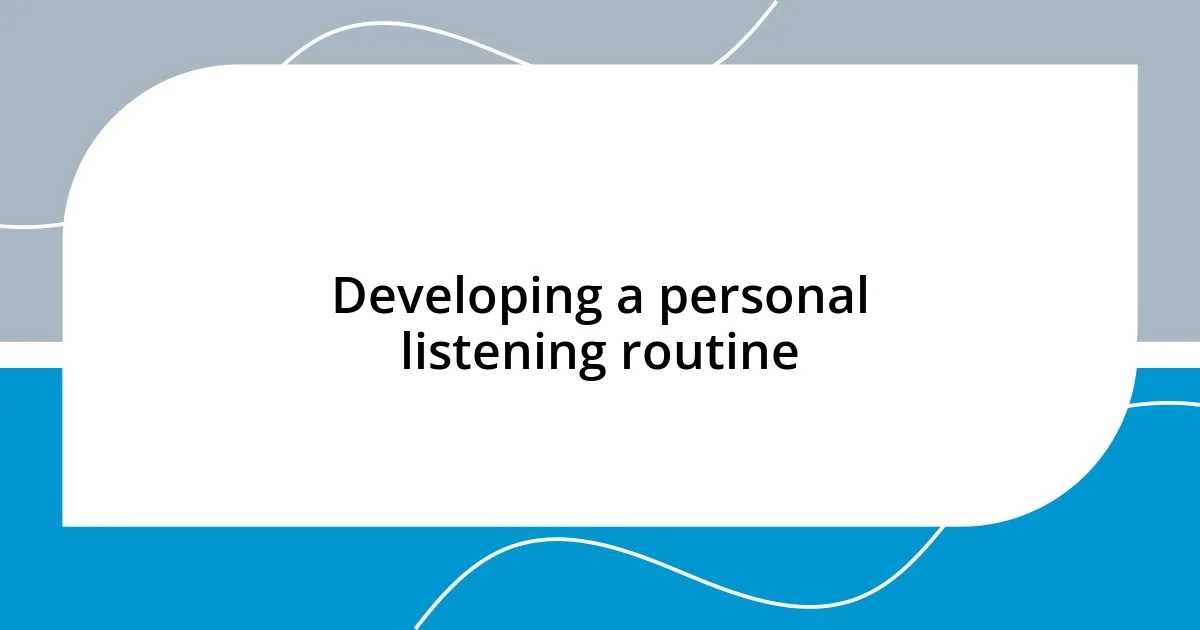
Developing a personal listening routine
Developing a personal listening routine has transformed my relationship with classical music. I recall when I first chose to dedicate a specific day each week solely to listening, creating a sanctuary for myself amid daily chaos. It became a sacred time—just me, my favorite pieces, and a cup of tea—allowing me to immerse myself deeper into the layers of each composition. Have you ever carved out time just to listen, free from distractions?
I also find that diversifying my playlist has enriched my experience tremendously. I started integrating different composers, styles, and even live recordings, which added an element of spontaneity to my routine. For instance, one evening, I stumbled upon a breathtaking performance of Rachmaninoff’s Piano Concerto No. 2, and the raw emotion in that piece left me spellbound. This unpredictability keeps my listening habit fresh and exciting. Isn’t it fascinating how a single piece can evoke such a strong emotional response?
Moreover, I’ve made it a point to reflect after each listening session. Jotting down thoughts in a journal helps me connect with the music on a personal level. I remember a time when I listened to Debussy’s “Clair de Lune” and wrote about how the gentle tones reminded me of a serene night under the stars. This practice allows me to tap into my emotional landscape and create a dialogue with the music. Have you ever considered how reflecting on what you hear can deepen your appreciation? It’s a small step that can lead to significant insights.








